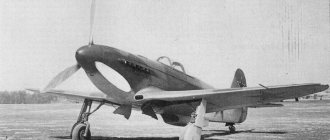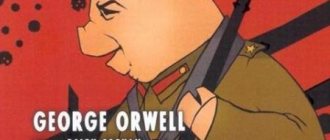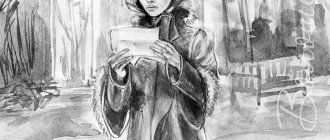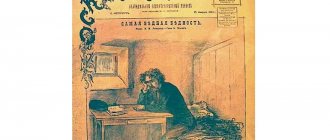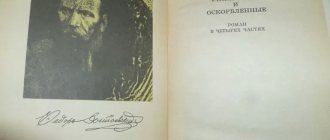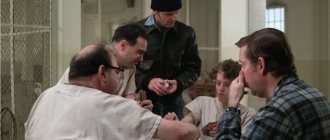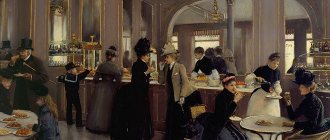Many authors have autobiographical works. Boris Polevoy is no exception to the rule. One of his best and most famous works is “The Tale of a Real Man.” Characteristics of the main characters will help you get to know the central characters better. The plot tells the story of a brave pilot who lost his legs after a combat mission. Pilots are still inspired by his courage and optimism.
Main characters
- Alexey Meresyev is the main character of the book, who spent 18 days alone after a plane crash. This is a strong, strong-willed and purposeful person.
- Semyon Vorobyov - “Commissar”, being on the verge of death, continues to amuse everyone in the ward and does not lose his desire for life.
- Grigory Gvozdev is a tank lieutenant whose body was left with many burns after the battle. I was in the room with Alexei.
- Pavel Struchkov , a pilot, was in the same room with the main character. A cynic who always spoke controversially about women and considered them the same, and then fell in love with a nurse.
Retelling briefly
A brief retelling of the work contains only the main events.
Alexei Meresyev's plane crashes in a battle with the Germans. Waking up in the forest, the hero discovers that his legs are badly damaged. He walks east for several days and stops each time after walking a thousand steps. To feed himself, he eats bark. Later, Alexey finds a lighter in his pocket, lights a fire and makes tea. The pain in his legs intensifies, so Meresyev begins to crawl towards the front. Miraculously, he makes it to a village, from where he is later sent to the hospital.
Due to gangrene, doctors amputate his legs. Vorobyov, Alexei’s roommate, encourages the protagonist with stories about a pilot who piloted a plane without a foot. Meresyev intends to return to the front again. He develops a special program and trains his legs. Alexey learns to dance through the pain so that his prosthetics will no longer restrict his movements.
With difficulty, he gets into a flight school and undergoes retraining there for 5 months. Soon he goes to the front, where he gets a new LA-5, on which he learned to fly at school. In the first days he shoots down 3 enemy planes and receives command of a division.
In total, the main character shot down 5 German fighters and was awarded the country's hero star. He later married his fiancee, who commanded a group of sappers. She promised to accept her lover in any condition and kept her word.
Alexey Meresyev
The characterization of this hero in the work speaks for itself. This is a young fighter pilot who was barely 23 years old when he found himself in a hospital bed. But at the very beginning of the story he is in the rank of senior lieutenant.
The following is known about this character:
- born into a simple working-class family living in a small town called Kamyshin (former Saratov province);
- He was left without a father early, so his mother raised him and his brother;
- Before the war, he worked at a factory as a turner and builder.
Alexey dreamed of the sky since childhood, so no one was surprised when he entered the military flight school. The young man volunteered to go to the front, and from the first days he fought enemy planes . But one of the flights became fatal for him; he was shot down on enemy territory, and as a result he had to land.
It took him almost three weeks to reach his own with broken lower limbs. When the man was found, his condition was extremely serious. The country's best doctors fought for the life of the heroic pilot. They were able to save Alexei's life at the cost of amputating his legs.
But Meresyev was an inveterate hero, he did not let go, the pilot trained through strength and pain, and after 18 months he again found himself at the controls of a bomber and continued to smash the enemy in the sky.
Summary by chapter
The plot of the work consists of four parts, each of which is divided into chapters.
Part 1
Chapters 1-3 Alexey Meresyev pilots a fighter. In one of the battles, he was surrounded by German planes. The hero tried to get out of the “claw”, but the German knocked him out. Alexei was thrown onto a spruce tree, which saved him by softening his fall.
When he woke up, the pilot noticed a thin, hungry bear, which began to tear his clothes. Alexey took out a pistol and shot the predator.
Trying to get up, he felt severe pain in his legs. As it turned out, his feet were crushed in the fall, so it was difficult for Meresyev to walk. He looked around and realized that he was in the place where the recent battle had taken place. The pilot decided to move east, towards his own people.
Chapters 4-7 In the evening of the same day, he reached the sanitary zone and removed the sheath and knife from the dead. In one bag he found canned food, which was very useful, because the downed pilot had no other food.
Since there was not enough food, Alexey decided to eat only at noon. He moved about 20 thousand steps a day, and each time, after walking a thousand steps, the man stopped to rest. It was difficult for him to move on his feet, so he cut out a couple of sticks.
Two days after the start of the journey, he found a lighter in his clothes. With its help, the pilot lit a fire. One day he was almost discovered by passing Germans and from then on he became more careful.
Chapters 8-9 The canned food ran out, so he chewed bark and drank tea, which slightly quenched his hunger.
Six days after the crash, he went to the battlefield where the Nazis were defeated. The man did not find anyone alive, but the sounds of volleys were heard nearby.
Chapters 10-14 With annoyance, the pilot realized that the fuel in the lighter had run out, so he could no longer make tea and warm himself by the fire. The pain in his legs became unbearable, and Meresyev had to crawl through the forest. But even so, he did not forget about his goal - to survive.
Our hero gradually moved towards the front until he suddenly heard voices: they were villagers who had joined the partisans and were forced to hide from the Germans.
Chapters 15-19 Alexei was settled in a dugout with his grandfather Mikhailo. He tried to get the wounded pilot out and even prepared a bath for him. After the bathhouse, Alexei’s condition worsened, so his grandfather brought to him the commander of the squadron in which Meresyev served. The commander sent the pilot to the airfield, and from there the main character was taken to one of the best hospitals in the capital.
The wounded Alexei is being taken to the unit where he served.
Part 2
Chapters 1-2
Meresyev was found to have gangrene in his feet. At first, Alexey lay on a cot in the corridor, but later Vasily Vasilyevich assigned him and several other wounded to the colonel’s ward. In the same room with him there were three more wounded soldiers, one of whom was named Grigory Gvozdev. He was a tanker who was burned in a battle with the Germans. Gregory's condition was very bad, and for a long time he was on the verge of death.
The professor persuaded Alexei to undergo amputation surgery. The main character was afraid to write about this to his fiancee Olga. He wanted her to forget about him and find herself a more worthy man.
Chapters 3-6 A week later, Semyon Vorobyov, who was nicknamed “Commissar,” entered the ward. He was a sociable and cheerful person; with his arrival, all the wounded seemed to live a new life.
Gangrene, meanwhile, developed, and the decision was made to perform an operation. Alexey had both legs amputated.
Chapters 7-8 Spring has come. Grigory became less withdrawn and was already talking with his roommates. Everyone except him received letters, so at the instigation of Vorobyov and Klavdia Mikhailovna, he began a correspondence with Anyuta, a student at the medical institute.
Wanting to cheer up Alexei, the Commissioner told him about a certain pilot who piloted a plane without a foot. Meresyev noted that it was easier for him, because he was missing only one foot. To this Semyon shouted: “You are a Soviet man!” Thoughts about the possibility of piloting a plane again that night kept Meresyev from falling asleep.
Meanwhile, Vorobyov’s condition was getting worse every day. Over time, Klavdia Mikhailovna fell in love with him, for whom he himself had feelings.
Chapters 9-12 Gregory fell in love with Anya, but was afraid that the girl would be frightened by his burnt body. Alexey continued to live in thoughts of piloting a fighter. He even developed a special training program, which he performed through pain, systematically increasing the load. Olga increasingly confessed her love to him in letters, but the wounded pilot answered her deliberately dryly.
With the onset of May, the Commissioner died. Everyone in the room was saddened, and the nurse suffered the most. In the evening, Struchkov entered the ward to see the wounded. When he asked whose funeral it was, he was told: “a real person.” From then on, Meresyev wanted to be like him.
The new roommate suggested that Meresyev bet that he would get Klavdia Mikhailovna’s attention. Everyone in the ward wanted to stand up for the nurse, but she refused Struchkov even without that.
Chapters 13-15 Alexey had to learn to walk on prosthetics. For a long time he walked on crutches from side to side. Meanwhile, Anya reciprocated Gregory's feelings. He was still afraid that his lover would not like him when she saw his face.
The main character learns to walk on prosthetics
In June, Gvozdev was discharged. He met Anya, but seeing that she was embarrassed by his appearance, he left her. Meresyev wrote a letter to Olga. In it, he asked his bride to forget about him, because he did not know when the end of the war would come.
Pavel developed feelings for Claudia Mikhailovna, but she replied that she would not love him. Meanwhile, Anya contacted Alexey and said that she was worried about Grigory’s unexpected departure.
Part 3
Chapters 1-4
In the summer, the main character was discharged and sent to an Air Force sanatorium to treat his wounds. Before this, he went out for a walk around the capital, where he suddenly met that same Anyuta. She invited Meresyev to visit her and said that Gvozdev was growing a beard to hide some of the scars and to please her more.
Upon arrival at the sanatorium, Alexey was assigned to Struchkov’s ward. Nurse Zinochka worked in the office: the main character asked her for dance lessons, and the girl agreed. At first, dancing was very difficult for Alexei, but he hid from those around him the pain he experienced with every step. Over time, dance classes began to bear fruit, and prosthetics no longer hampered Meresyev’s movements. Alexey took part in all dance events, and soon everyone got used to him.
A letter arrived from Olya, in which she said that she had volunteered and was now digging trenches near Stalingrad. The girl was very angry with his last letter, in which Alexey asked him to quickly forget him. Correspondence between the young people resumed.
Chapters 5-8 A commission for recruiting pilots came to the sanatorium. At first, they refused to allow the main character into aviation, but after he danced, the doctor changed his mind and indicated in the document that Alexey would be able to return to the flight crew.
At first, Meresyev had problems submitting the report. But later, thanks to Mirovolsky, he managed to get into the flight school. Alexei was afraid that he would be kicked out because of the prosthetics. However, at that time everyone was busy preparing for the Battle of Stalingrad, so the colonel did not waste time checking Meresyev’s documents.
Instructor Naumov, when he learned that the pilot had no legs, began to devote more time to training with him.
Chapters 9-11 Alexey trained at the camp for almost six months. The day of his test came, and he coped with his task, performing complex figures in flight. The colonel praised him and even offered to become an instructor, but he refused. After the flight, Meresyev received the best possible description.
He spent the entire winter and early spring in the camp. Alexey still felt that he was not yet fully in control of the fighter. Seeing this, Lieutenant Colonel Kapustin assigned him separate classes, because Meresyev was the only pilot with amputated legs. Soon the main character felt complete control over the plane.
Part 4
Chapters 1-2 By the summer of 1943, Alexei was allowed to go to the front. Arriving at the regiment, he saw that the battle with the Germans was now in full swing. He came under the command of Captain Cheslov, who assigned Alexey a modern LA-5 aircraft.
Chapters 3-4 Before the first flight, Meresyev was overcome with excitement, but everything went well. Lying on the ground, he read another letter from his bride. By that time, Olga was already leading the Stalingrad sapper platoon.
Chapters 5-6 In the next battle, the main character immediately shot down 3 German modern Focke-Wulf aircraft, which were piloted by experienced pilots. At the same time, Alexey managed to save his comrade and return safely to the airfield.
After this, he was appointed to lead the squadron, and Meresyev himself became respected throughout the regiment.
Boris Polevoy A Tale of a Real Man
Part one
1
The stars still sparkled sharply and coldly, but the sky in the east had already begun to brighten. The trees gradually emerged from the darkness. Suddenly a strong fresh wind passed over their tops. The forest immediately came to life, rustling loudly and loudly. The hundred-year-old pines called to each other in a whistling whisper, and dry frost poured with a soft rustle from the disturbed branches.
The wind died down suddenly, just as it had come. The trees froze again in a cold stupor. Immediately all the pre-dawn sounds of the forest began to be heard: the greedy gnawing of wolves in a neighboring clearing, the cautious yapping of foxes and the first, still uncertain blows of an awakened woodpecker, which resounded in the silence of the forest so musically, as if he was chiseling not a tree trunk, but the hollow body of a violin.
Again the wind rustled gustily through the heavy needles of the pine tops. The last stars quietly went out in the brightening sky. The sky itself became denser and narrower. The forest, having finally shaken off the remnants of the darkness of the night, stood up in all its green grandeur. By the way the curly heads of the pine trees and the sharp spiers of the fir trees glowed red, one could guess that the sun had risen and that the dawning day promised to be clear, frosty, vigorous.
It became quite light. The wolves went into the thickets of the forest to digest the night's prey, the fox left the clearing, leaving a lacy, cunningly tangled trail in the snow. The old forest rustled steadily, incessantly. Only the fuss of birds, the knocking of a woodpecker, the cheerful twittering of yellow tits shooting between the branches and the greedy dry quack of jays diversified this viscous, alarming and sad noise rolling in soft waves.
A magpie, cleaning its sharp black beak on an alder branch, suddenly turned its head to the side, listened, and crouched down, ready to take off and fly away. The branches crunched alarmingly. Someone big and strong was walking through the forest, not making out the road. The bushes crackled, the tops of small pines began to sway, the crust creaked, settling. The magpie screamed and, spreading its tail, like the feathers of an arrow, flew away in a straight line.
A long brown muzzle, topped with heavy branched horns, poked out from the pine needles powdered with morning frost. Frightened eyes scanned the huge clearing. Pink suede nostrils, emitting a hot steam of anxious breath, moved convulsively.
The old elk froze in the pine forest like a statue. Only the ragged skin twitched nervously on its back. His alert ears caught every sound, and his hearing was so keen that the animal heard the bark beetle sharpening pine wood. But even these sensitive ears heard nothing in the forest except the chatter of birds, the knocking of a woodpecker and the steady ringing of pine tops.
Hearing was reassuring, but smell warned of danger. The fresh aroma of melted snow was mixed with sharp, heavy and dangerous odors, alien to this dense forest. The black sad eyes of the beast saw dark figures on the dazzling scales of the crust. Without moving, he tensed up, ready to jump into the thicket. But the people didn't move. They lay in the snow thickly, in places on top of each other. There were a lot of them, but not one of them moved or disturbed the virgin silence. Nearby towered some monsters rooted in the snowdrifts. They emitted pungent and disturbing odors.
The elk stood at the edge of the forest, looking sideways in fear, not understanding what had happened to this entire herd of quiet, motionless and not at all dangerous-looking people.
His attention was attracted by a sound heard from above. The beast shuddered, the skin on its back twitched, its hind legs curled even more.
However, the sound was also not terrible: it was as if several May beetles, humming loudly, were circling in the foliage of a blooming birch. And their humming was sometimes mixed with a frequent, short crackling sound, similar to the evening creak of a twitcher in a swamp.
And here are the beetles themselves. Sparkling their wings, they dance in the blue frosty air. Again and again the twitch creaked in the heights. One of the beetles, without folding its wings, darted down. The others danced again in the blue sky. The beast released its tense muscles, came out into the clearing, licked the crust, glancing sideways at the sky. And suddenly another beetle fell away from the swarm dancing in the air and, leaving behind a large, bushy tail, rushed straight towards the clearing. It grew so quickly that the elk barely had time to jump into the bushes - something huge, more terrible than a sudden gust of an autumn storm, hit the tops of the pines and hit the ground so that the whole forest began to roar and groan. The echo rushed over the trees, ahead of the elk, which rushed at full speed into the thicket.
The echo got stuck in the thick of green pine needles. Sparkling and sparkling, frost fell from the tree tops knocked down by the plane's fall. Silence, viscous and imperious, took possession of the forest. And in it you could clearly hear how the man groaned and how heavily the crust crunched under the feet of the bear, which was driven out of the forest into the clearing by an unusual roar and crackling sound.
The bear was big, old and shaggy. Untidy fur stuck out in brown tufts on his sunken sides and hung like icicles from his lean, lean bottom. War had been raging in these parts since the fall. It even penetrated here, into the protected wilderness, where previously, and even then only infrequently, only foresters and hunters entered. The roar of a close battle in the fall woke the bear from his den, breaking his winter hibernation, and now, hungry and angry, he wandered through the forest, not knowing peace.
The bear stopped at the edge of the forest, where the elk had just stood. I sniffed its fresh, delicious-smelling tracks, breathed heavily and greedily, moving my sunken sides, and listened. The elk left, but nearby there was a sound made by some living and, probably, weak creature. The fur rose on the back of the beast's neck. He extended his muzzle. And again this plaintive sound came barely audibly from the edge of the forest.
Slowly, carefully stepping with soft paws, under which the dry and strong crust fell with a crunch, the animal headed towards the motionless human figure driven into the snow...
2
Pilot Alexey Meresyev fell into double pincers. It was the worst thing that could happen in a dogfight. Having shot all the ammunition, he was practically unarmed, four German planes surrounded him and, not allowing him to turn out or deviate from the course, they took him to their airfield...
And it all turned out like this. A flight of fighters under the command of Lieutenant Meresyev flew out to accompany the ILs setting off to attack the enemy airfield. The daring foray was successful. The attack aircraft, these “flying tanks,” as they were called in the infantry, gliding almost over the tops of the pine trees, crept straight up to the airfield, on which large transport “Junkers” stood in rows. Suddenly emerging from behind the battlements of a gray forest ridge, they rushed over the heavy carcasses of the "lomoviks", pouring lead and steel from cannons and machine guns, and throwing tailed shells at them. Meresyev, who with his four men was guarding the air above the site of the attack, clearly saw from above how dark figures of people rushed around the airfield, how transport workers began to crawl heavily through the rolled snow, how the attack aircraft made more and more approaches, and how the crews of the Junkers, who had come to their senses, began to under taxi to the start with fire and lift the cars into the air.
This is where Alexey made a mistake. Instead of strictly guarding the air over the attack area, he, as the pilots say, was tempted by easy game. Throwing the car in a dive, he rushed like a stone at the heavy and slow “crowbar” that had just taken off from the ground, and with pleasure hit its rectangular, motley-colored body made of corrugated duralumin with several long bursts. Confident in himself, he did not even look as his enemy poked into the ground. On the other side of the airfield, another Junkers took off into the air. Alexey chased after him. He attacked - and failed. Its fire trails slid over the car, which was slowly gaining altitude. He turned sharply, attacked again, missed again, again overtook his victim and knocked him down somewhere to the side above the forest, furiously stabbing his wide cigar-shaped body with several long bursts from all the on-board weapons. Having laid down the Junkers and given two victory laps at the place where a black pillar rose above the green, disheveled sea of endless forest, Alexey turned the plane back to the German airfield.
But there was no need to fly there anymore. He saw how three fighters of his flight were fighting with nine Messers, probably called by the command of the German airfield to repel a raid by attack aircraft. Boldly rushing at the Germans, who outnumbered them exactly three times, the pilots sought to distract the enemy from the attack aircraft. While fighting, they pulled the enemy further and further to the side, as the black grouse does, pretending to be wounded and distracting the hunters from their chicks.
Alexei felt ashamed that he was carried away by easy prey, ashamed to the point that he felt his cheeks burning under his helmet. He chose his opponent and, gritting his teeth, rushed into battle. His goal was the “Messer”, who had somewhat lost his way from the others and, obviously, was also looking out for his prey. Squeezing all the speed out of his donkey, Alexey rushed at the enemy from the flank. He attacked the German according to all the rules. The gray body of the enemy vehicle was clearly visible in the spider's crosshair when he pressed the trigger. But he calmly slid past. There could be no mistake. The target was close and could be seen extremely clearly. "Ammunition!" – Alexey guessed, feeling that his back was immediately covered in cold sweat. I pressed the trigger to check and did not feel that trembling hum that a pilot feels with his whole body when he uses the weapon of his machine. The charging boxes were empty: while chasing the “lomoviki”, he shot all the ammunition.
But the enemy didn’t know about it! Alexei decided to rush unarmed into the chaos of the battle in order to at least numerically improve the balance of forces. He made a mistake. On the fighter that he attacked so unsuccessfully was an experienced and observant pilot. The German noticed that the car was unarmed and gave orders to his colleagues. Four Messerschmitts, leaving the battle, surrounded Alexei from the sides, pinched him from above and below and, dictating his path with bullet tracks clearly visible in the blue and transparent air, took him in double “pincers”.
A few days ago, Alexey heard that the famous German air division “Richthofen” flew here, to the Staraya Russa region, from the west. It was staffed by the best aces of the fascist empire and was under the patronage of Goering himself. Alexey realized that he had fallen into the claws of these air wolves and that they obviously wanted to bring him to their airfield, force him to sit down, and capture him alive. Such cases happened then. Alexey himself saw how one day a flight of fighters under the command of his friend Hero of the Soviet Union Andrei Degtyarenko brought and landed a German reconnaissance officer at their airfield.
The long greenish-pale face of the captured German and his staggering step instantly appeared in Alexei’s memory. "Captivity? Never! This number won’t come out!” – he decided.
But he failed to wriggle out. The Germans blocked his path with machine-gun fire as soon as he made the slightest attempt to deviate from the course dictated by them. And again the face of the captive pilot with distorted features and a trembling jaw flashed before him. There was some kind of humiliating animal fear in this face.
Meresyev clenched his teeth tightly, gave full throttle and, placing the car vertically, tried to dive under the top German, who was pressing him to the ground. He managed to escape from under the convoy. But the German managed to press the trigger in time. The engine lost its rhythm and began to work in frequent jerks. The entire plane began to tremble with a deadly fever.
They knocked me down! Alexey managed to turn the clouds into a white haze and throw off the pursuit. But what next? The pilot felt the trembling of the wounded machine with his whole being, as if it was not the agony of a mutilated engine, but a fever pounding his own body.
What is the damage to the motor? How long can a plane stay in the air? Will the tanks explode? Alexey did not think all this, but rather felt it. Feeling like he was sitting on a stick of dynamite, towards which flames were already running along the fuse cord, he put the plane on the opposite course, towards the front line, towards his own people, so that if something happened, he would at least be buried with his own hands.
The denouement came immediately. The engine stopped and went silent. The plane, as if sliding down a steep mountain, quickly rushed down. Under the plane, a forest as vast as the sea shimmered with green-gray waves... “And still not captivity!” – the pilot had time to think when nearby trees, merging into longitudinal stripes, rushed under the wings of the plane. When the forest, like an animal, jumped at him, he instinctively turned off the ignition. There was a grinding crack, and everything instantly disappeared, as if he and the car had sank into dark, thick water.
While falling, the plane touched the tops of pine trees. This softened the blow. Having broken several trees, the car fell apart, but a moment earlier Alexei was torn out of the seat, thrown into the air, and, falling on a broad-shouldered, centuries-old spruce, he slid along the branches into a deep snowdrift, swept by the wind at its foot. This saved his life...
Alexey could not remember how long he lay motionless and unconscious. Some vague human shadows, outlines of buildings, incredible machines, flashing rapidly, flashed in front of him, and from their whirlwind movement a dull, scraping pain was felt throughout his body. Then something large, hot, of indefinite shape came out of the chaos and breathed a hot stench onto him. He tried to pull away, but his body seemed stuck in the snow. Tormented by unaccountable horror, he made a jerk - and suddenly felt the frosty air rushing into his lungs, the coldness of the snow on his cheek and a sharp pain no longer in his whole body, but in his legs.
"Alive!" - flashed through his mind. He made a movement to get up, and heard near him the crisp creaking of the crust under someone’s feet and noisy, hoarse breathing. "Germans! – he immediately guessed, suppressing the desire to open his eyes and jump up in defense. - Captivity means captivity after all!.. What should we do?”
He remembered that his mechanic Yura, a jack of all trades, had begun yesterday to attach a torn strap to the holster, but he never did; When flying out, I had to put the pistol in the hip pocket of my overalls. Now, to get it, you had to turn on your side. This cannot, of course, be done unnoticed by the enemy. Alexei was lying face down. He felt the sharp edges of the gun on his hip. But he lay motionless: perhaps the enemy would take him for dead and leave.
The German stomped around, sighed strangely, and again approached Meresyev; He crunched the infusion and bent down. Alexei again felt the foul breath of his throat. Now he knew that the German was alone, and this was an opportunity to escape: if he waylaid him, suddenly jumped up, grabbed him by the throat and, without allowing him to use his weapon, started a fight on equal terms... But this must be done prudently and accurately.
Without changing his position, slowly, very slowly, Alexey opened his eyes and through his lowered eyelashes he saw in front of him, instead of the German, a brown furry spot. He opened his eyes slightly wider and immediately closed them tightly: in front of him, sitting on his hind legs, was a large, skinny, tattered bear.
main idea
Boris Polevoy's story “The Tale of a Real Man” encourages you to believe in yourself and never give up if there is even the slightest hope of success. No one could have thought that Alexey would return to the controls of a combat aircraft. However, he set a goal for himself and gradually moved towards it, even despite the absence of both legs. For his efforts, the pilot was rewarded with the opportunity to realize his dream and fly a fighter again. It is recommended that you go beyond the brief description and read the entire book.
The history of the story
Polevoy completed the work by 1946, and was subsequently awarded the Stalin Prize of the second degree for his work. The story is based on the story of a pilot with a tragic fate, who, despite difficult life circumstances, showed extraordinary fortitude, did not give up, but continued to faithfully and devotedly serve his Motherland. We are talking about Alexei Maresyev, who lost his feet in a plane crash, but mastered the skill of flying a fighter with the help of prosthetics.
Many correspondents sought to meet Alexey at least for a few minutes to hear his story first-hand. However, the meeting with Pravda newspaper reporter Boris Polev, who wrote down his confession in the notebook “Flight Diary of the 3rd Squadron,” became fateful. Later, the author will need only 19 days to use scraps of reporter’s notes to write a book about this brave man and publish it in the October magazine.
